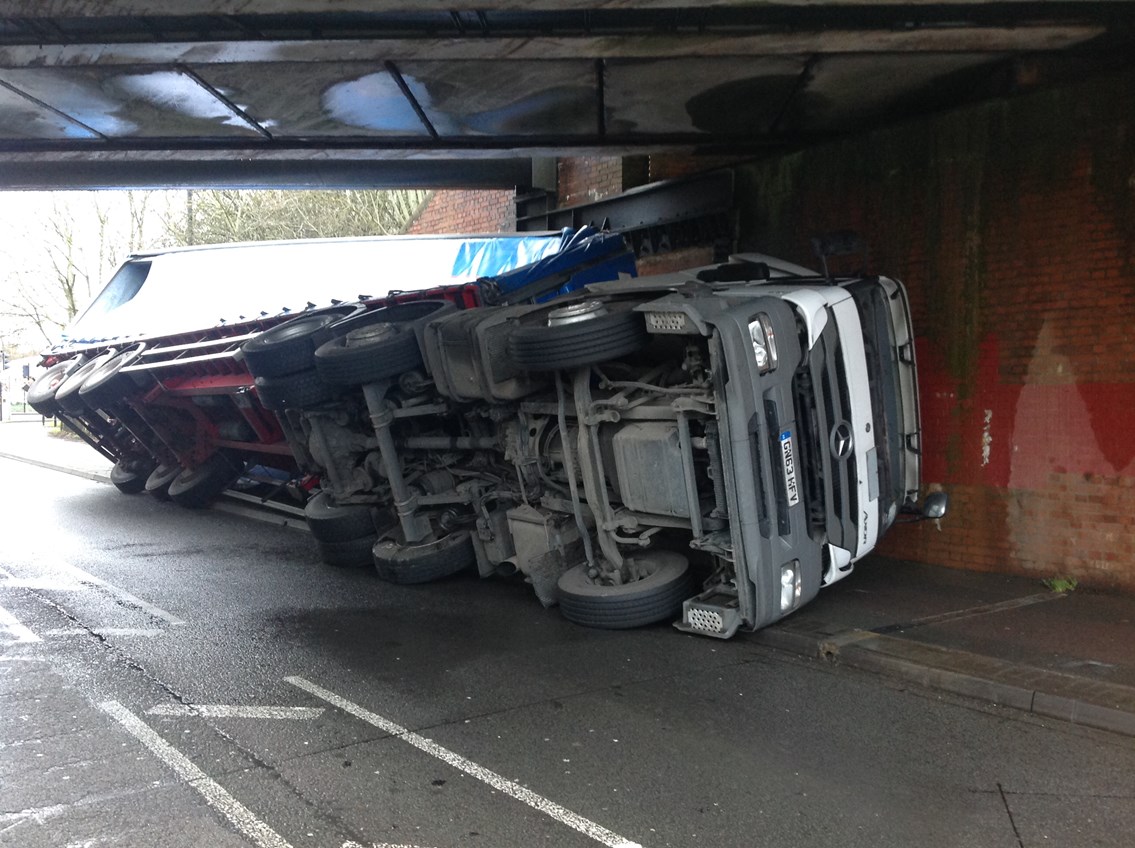Monday 30 Oct 2017
Wiltshire named as worst county for bridge strikes on Great Western as new campaign launches
- Region & Route:
- Wales & Western: Western
- | Wales & Western
Thousands of rail passengers in Wiltshire will suffer hours of delays and cancellations in the next month as 'bridge-strikes' - when a lorry that's too big hits a low bridge - reach their peak, with new figures revealing that at this time of year there are more incidents than any other time of year.
In Wiltshire, there have been 14 bridge strikes in the last six months- the highest number of any county on the Great Western route, which runs through West London, Berkshire, Oxfordshire, Worcestershire, Wiltshire, Gloucestershire, Somerset, Devon and Cornwall - contributing to a £23m cost to the taxpayer in damages and delays with each incident causing a two-hour delay on average.
The most-struck bridge in the county is the underbridge on Malmesbury Road in Hullavington, which has been struck on five occasions since April 2017.
Research suggests there could be more bridge strikes in Wiltshire in the next month, which could be owing to the hour change and increased deliveries ahead of Christmas.
The new data and significant impact on the railway that bridge strikes have has led to Network Rail launching a new 'bridge bash' campaign aimed at HGV drivers and haulage companies.
Network Rail’s campaign has eye catching straplines such as 'What the truck' and 'Lorries can't limbo' and involves:-
- Engaging the haulage and public transport industries
- Fitting steel beams on rail bridges where there are a large number of strikes to reduce the impact, resulting in less damage to infrastructure
- Working with local authorities to ensure road signs displaying bridge heights are correct and up to date
- Calling for stricter enforcement of penalties for drivers when strikes do happen.
Network Rail has been working across the industry, getting key players on board and banging the drum about the issue to stop strikes before they happen. The rail infrastructure company has already started to raise awareness of the issue by liaising with logistics companies and working with trade bodies such as the Road Haulage Association (RHA) with the aim of drastically reducing these incidents.
Following months of research into why strikes happen, the campaign will be launched to all key players in the haulage industry calling on them to challenge their drivers to ‘check it, rather than chance it’ running until April next year.
Kevin Laidlaw, senior asset engineer for Network Rail, said: “Bridge strikes are a huge burden on the rail and road systems, as well as on the taxpayer, so we are working with key influencers in the industry to reduce the number of these easily-avoidable incidents.
“Wiltshire has had more bridge strikes so far this year than any other county on the Western route, causing inconvenience to thousands of people travelling in the region and beyond.
“We need HGV drivers travelling through Wiltshire and their employers to get on board with our initiative and make bridge strikes a thing of the past."
ENDS
Notes to Editors
Research has found:
- 43 per cent of lorry drivers admit to not knowing the size of their vehicle
- 52 per cent of drivers admit to not taking low bridges into account when planning their journeys
- Five bridge strikes happen across the country everyday - with a peak of 10/day in October
- On average, each bridge strike costs £13,500 and causes two hours of delays to train service
Figures as of October 2017.
Contact information
Passengers / community members
Network Rail national helpline
03457 11 41 41
Latest travel advice
Please visit National Rail Enquiries
Journalists
Network Rail press office -Western route
MediaRelationsWestern@networkrail.co.uk
About Network Rail
We own, operate and develop Britain's railway infrastructure; that's 20,000 miles of track, 30,000 bridges, tunnels and viaducts and the thousands of signals, level crossings and stations. We run 20 of the UK's largest stations while all the others, over 2,500, are run by the country's train operating companies.
Usually, there are almost five million journeys made in the UK and over 600 freight trains run on the network. People depend on Britain's railway for their daily commute, to visit friends and loved ones and to get them home safe every day. Our role is to deliver a safe and reliable railway, so we carefully manage and deliver thousands of projects every year that form part of the multi-billion pound Railway Upgrade Plan, to grow and expand the nation's railway network to respond to the tremendous growth and demand the railway has experienced - a doubling of passenger journeys over the past 20 years.
Follow us on Twitter: @networkrail
Visit our online newsroom: www.networkrailmediacentre.co.uk

